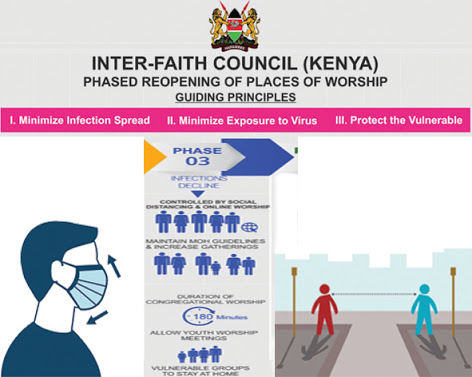KENYA: Welcoming Phase Three on Resumption of Public Worship Interfaith Council Emphasizes Adherence to Protocols

Sr. Jecinter Antoinette Okoth, FSSA
Nearly a month after the government of Kenya extended the term of office for the Interfaith Council for National Response to Coronavirus Pandemic, the body has recommended transition to phase three while asking all citizens to “sustain compliance to the guidelines.
According to the religious leaders, adherence to Ministry of Health guidelines is the major weapon in the battle against Covid19,” hence they urge “politicians to lead by example.”
“In view of the decline of the number of new cases, and in general the number of casualties of Covid-19, we have decided to transition to Phase 3 of the Phased reopening of our Public Worship,” members of Interfaith Council stated in the statement signed by the chairman Archbishop Anthony Muheria.
According to the Council, the country has experienced reduced number of new reported infections and a decline in the second wave of Covid-19 infections though people must be “cautious of the possibility of a third wave.”
“We wish to reiterate once again that this battle can only be won if all of us in our places of worship and also in the public space, continue to observe and sensitize others to comply with the guidelines issued by this Council and by the Ministry of Health (MoH), reads an excerpt of the press statement dated Saturday, March 6.
The Council has stressed, “We will continue to have controlled worship gatherings.” Therefore, congregants have been cautioned that being cautious to the provided guidelines is fundamental and “we should not lower our guard at this crucial moment.”
In their Saturday statement, the Interfaith Council which comprises of 16 members from various faith institutions reminded religious leaders to “continue demanding that all worshippers wear their masks properly, wash or sanitize before and after the services, and strictly observe the social distance of 1.5m in places of worship.”
As the country transitions to phase three, the youth and children services gatherings have been allowed and maximum time period for worship has been reviewed to 180 minutes.
Even though the Church leaders have noted decline in the second wave of Covid-19 infections spread, they decry lack of compliance to Covid-19 measures especially during funerals which tends to be the main challenge in spreading the Coronavirus.
“We continue to face the greatest challenges at funerals. We wish to highlight that this continues to be the highest threat by far, for infection spread,” the Council members lament.
“We plead to all religious leaders to lead the way and demand from our congregants to observe the minimum preventive measures in the funerals” including taking maximum of 2 hours in the funerals and no meals should be served.
Expressing their regret about political leaders for failing to act responsibly in observing the Ministry of Health directives, the Interfaith Council members said in their collective statement, “Much as we are making all efforts to avoid contagion and spread in the places of worship, we are disappointed and appalled by the attitude of many of our Political leaders who have continued to have public and political gatherings while taking no preventive measures themselves.”
“This reckless behavior and bad example, has unfortunately influenced many Kenyans, making them take compliance to the protocols less seriously, and even at times to totally ignore them.”
Meanwhile, the faith leaders have acknowledged the arrival of Covid-19 vaccine in the country hoping it will “act as a good defense against further spread of Covid-19, starting with our front-line workers.”
“We urge Kenyans to note that even the vaccinated person must follow the MoH guidelines since there is no guarantee that a vaccinated person cannot be infected or transmit the virus to others and how long the immunity will last,” the collective statement reads.
The Church leaders asked Kenyans to continue intensifying prayers so that God can intervene and bring the Pandemic to an end. Additionally they noted, “Our vigilance will still remain on high alert should there be a need to review the guidelines or the phases.”


